Automotive Artist Tom Fritz Part 2 .What does Tom mean by ‘slick licks?’ From Classics to Hot Rods to So Much More.........
What kind of techniques do you use for your painting and how do you start?
I’m very, very direct with my paintings. I start with a light sketch; based on an image that 95% of the time I’ve put together myself. Again, What Do You Reckon She’ll Do? That car is based on four existing images that are known about that certain vehicle. The guys, I posed the guys with friends of mine, pizza delivery boys, my son’s buddies from school, whoever’s available, I’ll dress them and I’ll pose them and use them as my models.
I don’t like working from old photographs because, number one it’s copyright infringement, number two, all the other artists out there who aren’t really doing much work, they’re basically copying the old photographs. And so, a lot of the photographs I work from, I know other artists have painted them, but why would I paint something that somebody else has already painted? That’s ludicrous to me. I want to make my own work; I want to create my own compositions. A lot of the other artists, when they paint those old photographs, whether they know it or not, they’re painting compositional errors into their paintings, because they’re painting the same compositional errors that are in their photograph. So that’s why I work from my own material.
As far as technique goes, I start with a light sketch, and then I just start working in oil painting. I don’t do what I call ‘color in the shapes.’ A lot of guys will do a lot of heavy…kind of fill in the shapes with color, I start laying color all over the canvas, sometimes I’ll stain the entire canvas a certain color, and then start working out from that.
I don’t do a lot of slick licks, basically I mix color on a brush, pick it up, and I start putting…I basically start cleaning the brush off on the canvas. There’s no mystical licks out there, I’m honestly just putting paint on canvas.
What do you mean with ‘slick licks?’
A lick would be a brush stroke, and a slick lick would be like a tricky brush stroke, like, you start with your brush in your hand this way and then you flick it at the end of something.
I don’t do that, I lay the color down so that the stroke visually equates to what the shape is, the direction of the shape on the canvas is, it’s almost like you’re modeling, in two dimensions for your eye.
I don’t do that, I lay the color down so that the stroke visually equates to what the shape is, the direction of the shape on the canvas is, it’s almost like you’re modeling, in two dimensions for your eye.
I don’t try to hide my brush strokes and I don’t want to replicate the camera lens. I like to lay down a stroke so you can see that I made a visually and comprehensive decision to make the paint lay in that direction. You can walk up to my painting and if you get close to it, you can see that I laid this stroke down, then on top of that I laid another stroke, then I laid a third stroke on top of the other two, almost like a timeline. So you can actually walk up to my canvas and you can see my thinking process when I put the painting together.
I’m not hiding it. For me, if you try to make a painting look like a photograph, a lot of times Marcel, honestly, I’d rather see the photograph. Because there’s no way that a human being will duplicate what the camera lens has already done. That’s just me as an artist, that’s how I satisfy my eye. I want to see paint, I want paint to stay as paint, I want it to be paint. And, it satisfies my eye.
There’s another quality to my work that other critics and judges have brought to my attention. If you get up close to my paintings and you look at them, you see a surface with paint on it. It looks like you just buttered some toast. Different colors, different shapes, and because it’s just paint strokes, it reads kind of as an abstract. But when you stand back, there’s a, they call it a flicker of an instant, and all of those brush strokes suddenly coalesce, they harden up, they solidify into a three-dimensional reality. So what you’re looking at when you’re looking at my work, in one moment, there’s a two-dimensional surface with paint on it, in the next moment, there’s a three-dimensional reality that appears before your eyes. That’s pretty trippy.
Many of your artworks show great sunsets or night scenes with bright headlights. How do you work with light?
That quality of light is most important to me. I can paint horses, I can paint chickens, barnyard animals, streams, with you know, water going over rocks. Snow laden mountains. I can paint all that because I want to paint that quality of light. And, when I paint, especially the sunsets, the sunsets or the sunrises, that’s the golden time during the day. The sun is low, the light is coming through a lot of atmosphere, the shadows are long, it’s very dramatic.
I just love that light element coming out of the painting. I’m getting that out of the same tubes of paint that all the other artists are getting. We all buy the same tubes of paint, but for some reason the way I mix my color, the light is coming from within the painting. That’s color theory. That’s understanding how color works up against other colors. The quality of light. Hopefully I’ve been able to get this across on the internet.
If you’ve never been to one of my shows, the thing you hear most about is that the paintings appear to be lit from within. The light is coming from within the painting. And that’s what my paintings do. When I was in college, I studied color theory, and I continue to study it today and I try to push the boundaries within the confines of taste. I experiment with color.
Tom, I really enjoyed this nice conversation on your automotive art.
Thanks a lot, I enjoyed it Marcel. And I just want to say thanks to all the people out there that enjoy my work and have shown their love and support over the years.
Check out Tom Fritz his website www.fritzart.com to see more of his fine Automotive Art.

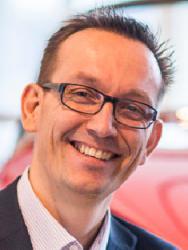
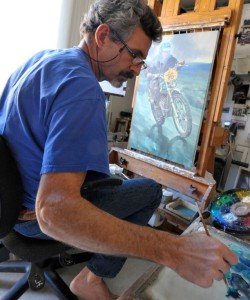
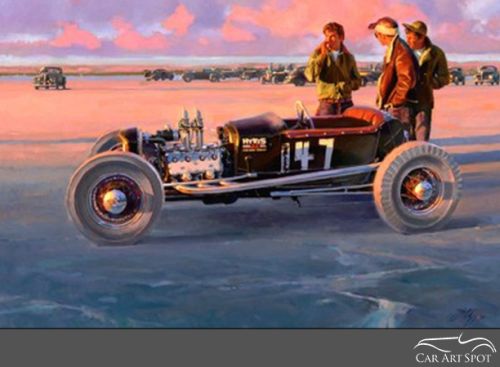
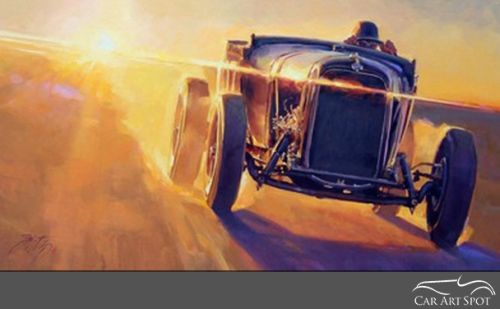
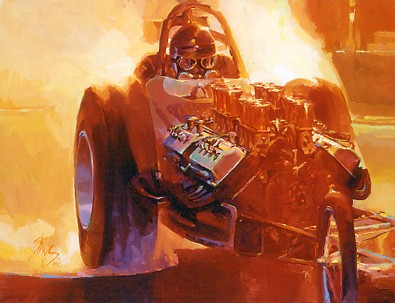
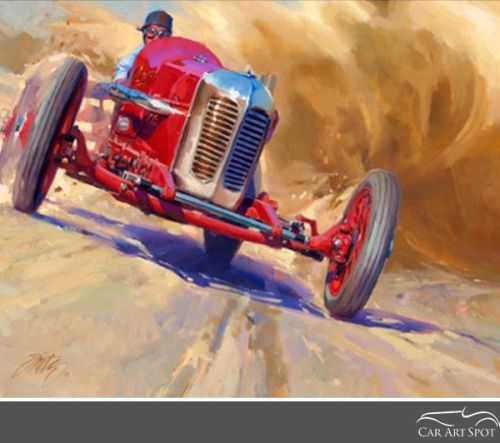
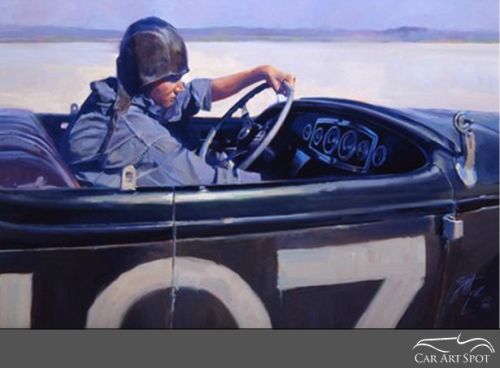
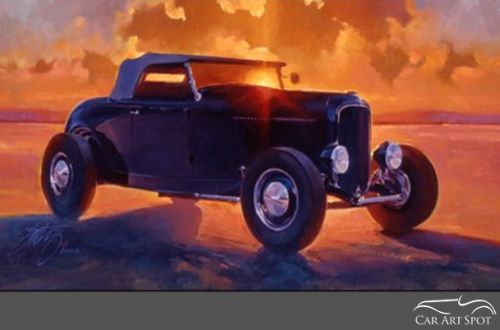
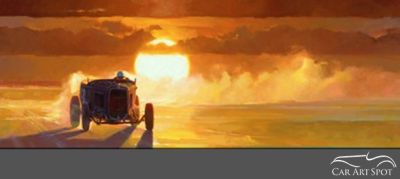
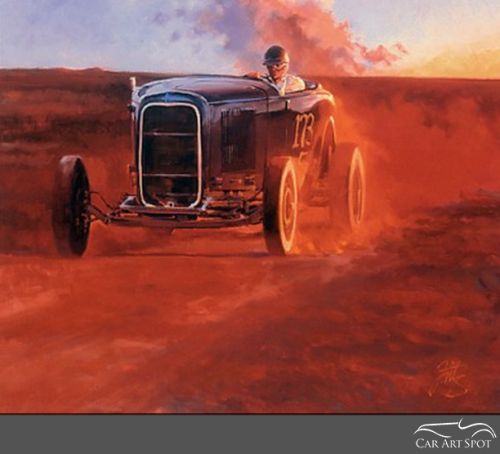
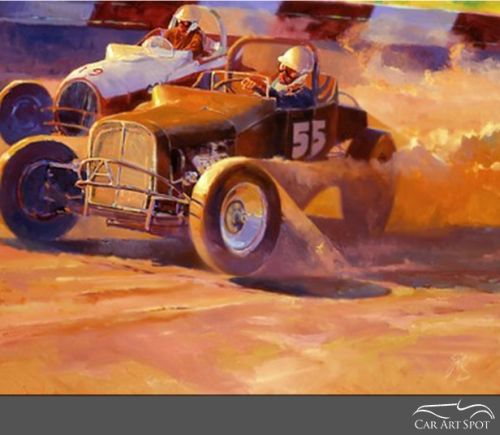
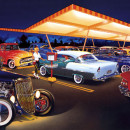
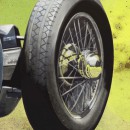
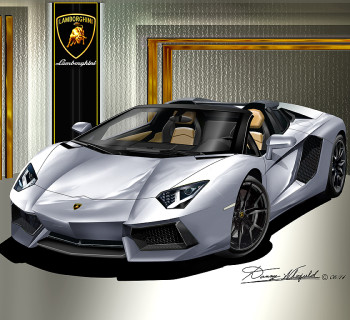
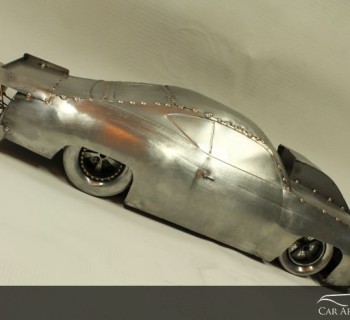
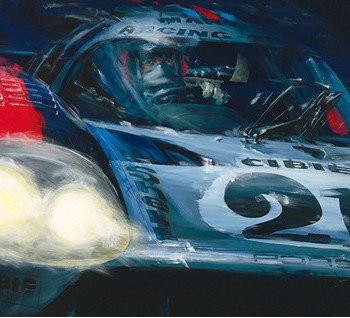
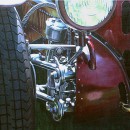
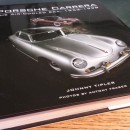
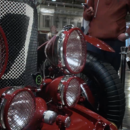


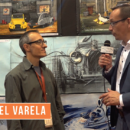
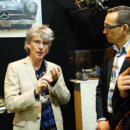
[…] In my next automotive art blog Tom Fritz will share with us his techniques and how he creates his art. READ PART TWO OF HIS INTERVIEW. […]